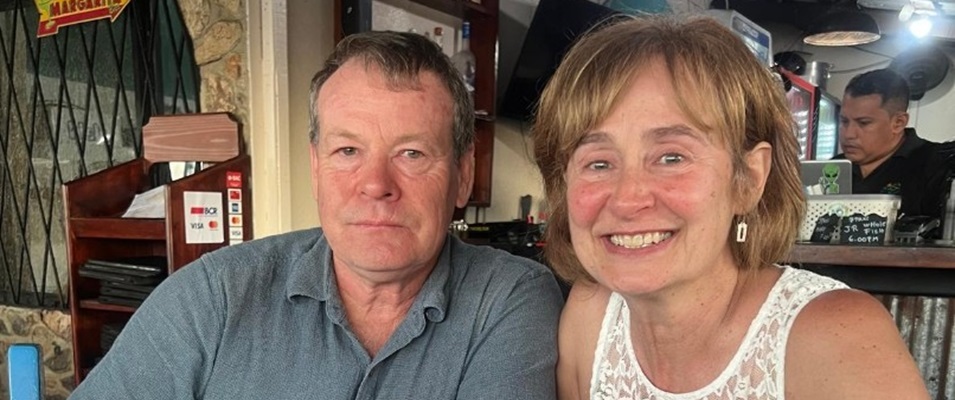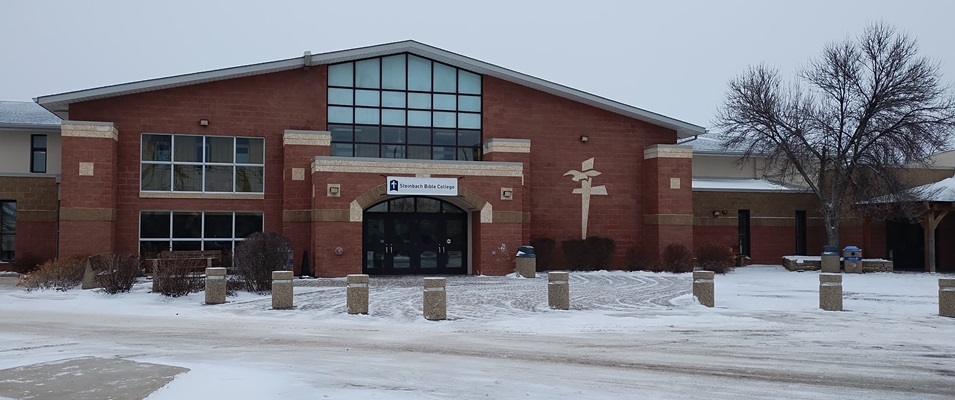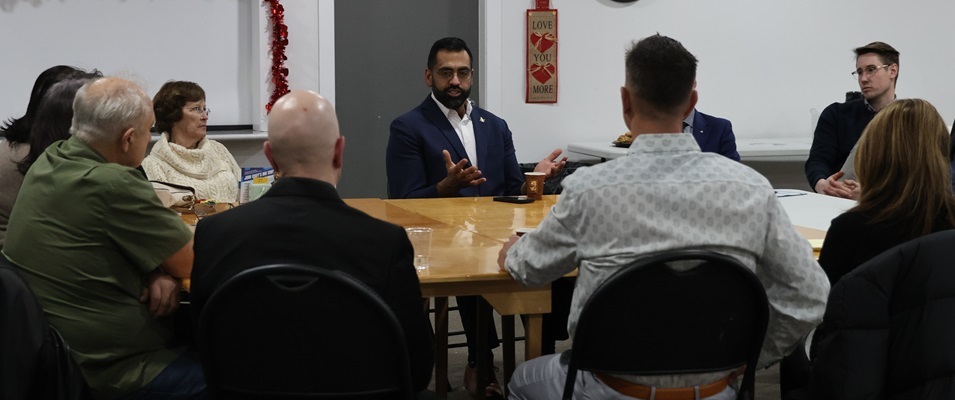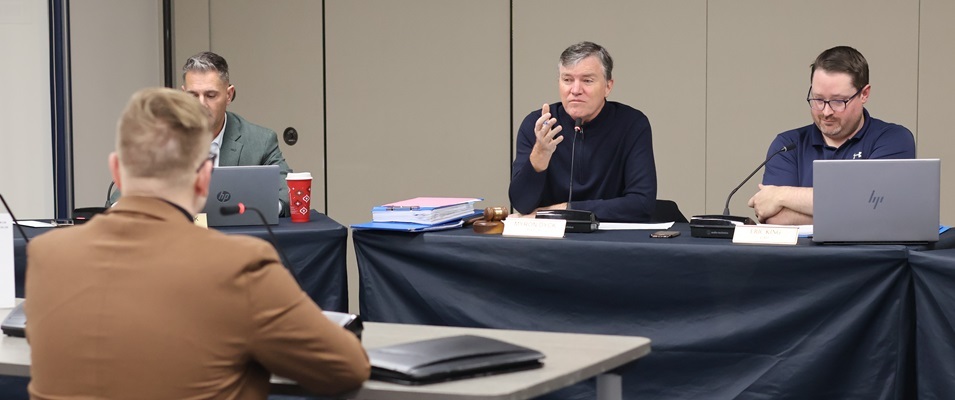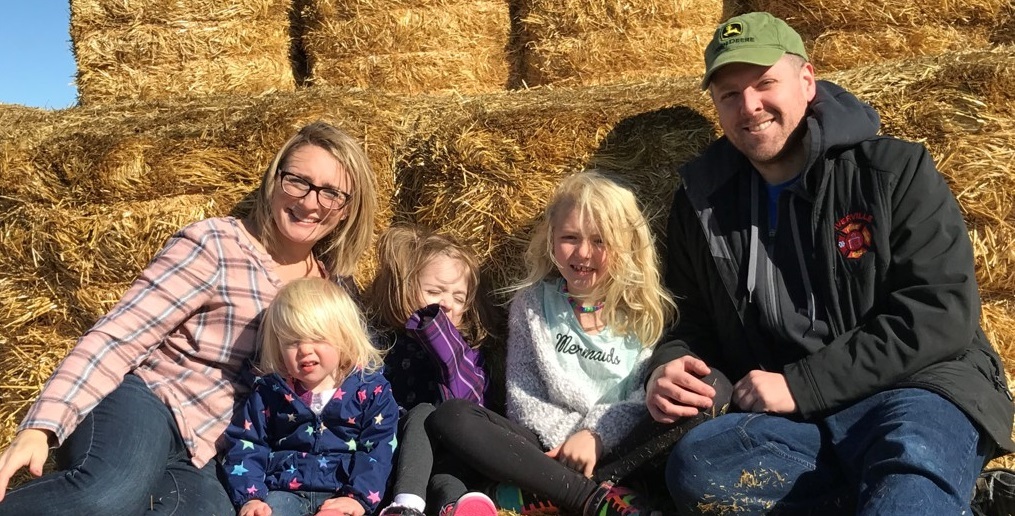
The pandemic and economic hardships of the last couple of years have been challenging for everyone, leading many people to rethink key aspects of their lives—including how they earn a living. In this ongoing series, The Citizen is telling the stories of courageous locals who have rolled with punches, making significant career changes for the sake of themselves and their families. (Read the first article in this series.)
After working in healthcare and starting his own businesses as an entrepreneur, Garrett Hawgood found meaning in becoming a full-time primary caregiver when his kids needed him most.
Hawgood always wanted to make a difference, and while living in Winnipeg he underwent paramedic training, which also qualified him to work as a healthcare aide. After additional certification, he moved around to other work in a variety of healthcare settings, including being an orderly for elderly patients and an operating room attendant.
Then Hawgood started a family with wife Kate. And nothing could have prepared them for the struggle they would face when their children had to confront their own healthcare challenges.
The couple’s daughter, Keira, was born with a rare medical condition called CDKL5 which presents with powerful seizures and neurological impairment. Additionally, the couple’s oldest daughter, Kennedy, was diagnosed with lymphoma cancer.
Hawgood had been working in Winnipeg since 2008 as a paramedic and the family moved to Niverville in 2012. In 2014, Hawgood took a position as a full-time firefighter and Kate took a job as a teacher at the elementary school in town in 2016.
That same year, Hawgood embraced his entrepreneurial side and started a business called Aim for Life. While he continued in his other healthcare work, Hawgood began to offer CPR and first aid training, as well as working to help communities increase access to automated external defibrillator (AED) machines in their businesses and event centres.
Hawgood says Aim for Life was largely inspired because of an event that happened with Keira a few years earlier when he found her unresponsive in their home and needed to perform CPR.
“When I came in and saw her lying there… it was a moment that stays with you. There’s no way to describe how that is going to be a life-changing moment,” says Hawgood. “It was a life or death situation and I knew she needed me… I did what I needed to do.”
As Hawgood worked hands-on with the AED machines, spreading awareness and teaching the very life-saving skills he had used when helping his daughter, he realized that the work posed some significant mental and emotional challenges for him.
To manage the reaction to the memories he had of his own experience, he realized he needed to take frequent breaks from portions of the class material.
“I knew my limits, and it became a learning experience for me,” says Hawgood. “All of us as people have limits, and that’s nothing to be ashamed of. Knowing that we can speak up for ourselves about what we need in certain situations is a skill that we can all use more practice with. It should be common to speak up, even in a professional setting, about what you know you can handle and what you can’t, and knowing that our professions can and should support that kind of honest will improve things overall for people. For me, I knew I couldn’t be around the dummies and that was okay. I backed off when I knew I needed to.”
When the COVID-19 pandemic reached Manitoba in 2020 and schools began to transition to a period of extended online learning, the Hawgood family found themselves faced with another challenge.
“We were in the same position as other parents,” he says. “It was hard for so many, needing to find a way to care for their children who were all of a sudden at home, and we had Keira. She needed extra care, and not being in school meant there was an even bigger need for us now at home to have someone taking care of her for those hours.”
Hawgood decided to take a leave of absence to stay home and care for Keira. He quickly realized he couldn’t continue Aim for Life while bubbling at home to protect Keira’s health. It was too difficult to transition the in-person class format to an online format when COVID made it necessary to halt in-person classes due to public health restrictions, so the first-aid-based business came to an end. Hawgood transitioned the small business to a new owner and decided to embrace homemaking full-time.
With all three children at home, Hawgood gladly accepted the responsibility of being the primary caregiver for their three children.
But that doesn’t mean he found being a stay-at-home parent easy.
“It was really hard,” he says. “We had Keira home before the schools officially closed, and when the schools fully closed we knew it would be really hard with all three kids at home. There was an opportunity there for me to be there for my kids. There was no way around it. We needed someone fully and consistently there for them and I didn’t hesitate. I took it on and we did what we needed to do. That doesn’t mean it was easy.”
Throughout staying home with his kids during COVID, Hawgood’s intention was to continue working for the good of the community and he kept an open mind about what that could look like when it came to possibly accepting employment outside the home again.
Eventually, he saw the possibility for a good fit when the Community Resource amd Recreation Centre (CRRC) opened. The centre’s doors been operational for about three months when Hawgood learned of a job opportunity with the recreation campus staff.
“I greet people as they come into the centre and I help with bookings or even program development,” says Hawgood. “There is some setup and maintenance that we do to keep things running smoothly and it’s been exciting to see the various activities going on. It’s a facility that meets so many needs and attracts people from all walks of life. From speedskating to gymnastics, to kids programming and the elderly, every kind of person comes through these doors. It’s so good to see.”
Though it’s a considerable change from his career in healthcare, Hawgood appreciates the positivity and flexibility of the work environment, and he continues to be able to make a difference in the lives of others. He sees his job as an opportunity to give back to the community that has given so much support to him and his family.
“The community around here has been so welcoming and supportive,” says Hawgood. “When we needed a wheelchair van, so many people stepped up. In and around Niverville, in Kleefeld and Steinbach, people have gotten to know about us and about Keira, and they’ve organized fundraising and even helped with the costs with her care.”
Hawgood sees opportunities to help others and provide social support as one of the most important areas he can continue to increase awareness in the community.
He is especially excited about one program the CRRC may be offering in the near future, called Mindful Munchkins. It’s a program for children that helps them work toward identifying emotions and how to manage them. Kids will learn about self-regulation, developing problem-solving skills, fostering positive self-esteem, and modelling empathy.
“It’s going to help kids immensely,” says Hawgood. “They’ll be exposed to skills in language that I didn’t grow up with, that the generation above me didn’t grow up with. To have knowledge of language surrounding human emotion is going to set them up for life. It’s very exciting.”
Through all of Hawgood’s career changes, his passion to work with people is what continues to shine through in every place of employment.
Because of a combination of his psychological first aid training and his experience in a supportive community, Hawgood has seen firsthand how caring and knowledgeable people can turn a bad or unstable situation into something better.
“Sometimes it’s a matter of knowing what to do or say, or where to find help and resources, but sometimes it’s just a matter of listening,” he says. “When you tell your story and find there was someone to listen to it, it makes you feel better. You are validated and there is real-world value in someone just having listened. There is also the benefit of the person who did the listening, because your story may end up helping them.”
And this is why Hawgood continues to tell his story and enjoys working with the public every day. He has a sensitive view of the world and will continue to be prepared to be ready with an encouragement to anyone who needs it.
For anyone going through a period of uncertainty, Hawgood wants them to know there is always a next step.
“Life is a series of ups and downs, and sometimes little ups and big downs, but then there will be some big ups, too,” says Hawgood. “The challenge is that we can’t see over any of those hills. And when you’re in it, it seems like it’s a lot or even too much. I don’t have the answers for everyone, but for me I eventually saw that I was learning skills. If you can learn even one thing from a crisis or a bad experience, then you can apply that to the next thing. So I saw that I was able to take a skill that I’d learned from one hill and apply it to the next and so on. We can’t see 30 years from now, but we can choose how we react to the next step.”
He knows from experience that life doesn’t come with a roadmap and figuring everything out—from personal life, to education choices, to career journey—doesn’t have to happen instantly.
“Some people, as kids, may have one thing they want to be, but others want to be a pilot, a firefighter, a cowboy… They have a lot of ideas. And somewhere along the line, someone tells them they have to pick one,” says Hawgood. “Well, that’s not true. You can pick more than one. And we should normalize moving on from one choice if it ends up not being the right now. And if you feel stuck and something isn’t contributing well for you, or beginning to be a place that you are suffering, you can feel empowered to move on. Choose something new. Make a new choice.”








